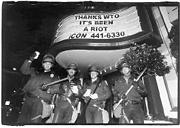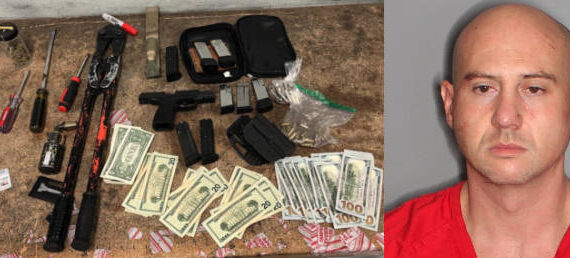Even as the legacy of Seattle’s WTO protests spreads across the political landscape to DC, Philly, and LA, Seattle provincialism says: Oh, let’s move on, people. WTO was so last year.
We are moving on, of course. The folks who both brought us the WTO conference and botched the planning so badly that it created a climate ripe for riots and civil rights abuses on a massive scale—enough, remember, to get the attention of groups like Amnesty International—are still in power: Paul Schell is mayor and is picking the new police chief; Pat Davis still promotes trade and sits in her powerful Port Commission seat; the Stamperless SPD holds consultant reports that urge them to take an even harder line with protesters next time and, yes, to get rid of that pesky, privacy-protecting surveillance ordinance.
The City Council, many of whom were on the old council that stood by and allowed the WTO to come to town and rack up bills we’re expected to pay now, has been working with citizen’s committees to investigate various aspects of the mess. Their final report should be out later this month. To date, they’ve uncovered some interesting documents and gleaned some important testimony, though their charge is unnecessarily limited. Like the boosters who brought us WTO in the first place, their focus is narrow and they aren’t willing to come up with the money to do it right.
So Seattle toddles on, business as usual.
We couldn’t wait for the full City Council report, so we wrote our own. The WTO is such a huge story and touches so many aspects of life in the city that we couldn’t cover it all. But we read the various reports, dug through documents, scanned testimony, talked with sources, and came up with answers to some of WTO’s most persistent and troubling questions. There are clearly individuals who screwed up—who quite simply failed to do their jobs. There are public officials who breached the public trust and misled the city and its citizens. There are people who wanted to do the right thing but were prevented from doing so because of politics.
One of the lessons of WTO is that the protesters were more right than most people gave them credit for, especially the local media. If we allow corporate greed and self-interest to drive our politics, Seattle is the perfect example of what can result:
*As demonstrators railed against the backroom deals of the WTO that might destroy rainforests and sea turtles, so our own local corporate promoters wheeled and dealed behind the scenes to bring the conference to Seattle, even though they knew it would be more costly and more controversial than they cared to admit. Public process? They didn’t need no stinkin’ public process.
*As demonstrators claimed that the WTO would erase political accountability for political decisions, so many of our own public officials sought to keep their fingerprints off WTO. They quietly supported it before the fact, and hid during and after.
*As demonstrators called into question whether the WTO would benefit ordinary people, the city racked up huge bills. The public must pay for what was, in essence, a private meeting of the world’s richest financial interests. Naturally, the fat cats get a freebie.
*As demonstrators complained of economic and political oppression, our own police were stocking up on “nonlethal” weapons to use in “worst-case scenarios” against peaceful protesters. In panic, they used these weapons, often without regard for the consequences and often in violation of any recognized standard.
*As demonstrators stood up for the rights of the world’s non-elites, political expression and protest was unconstitutionally suspended in our own downtown. The rights of shoppers trumped the right of free speech, and many Seattleites were arrested for their looks alone.
*As demonstrators worried that globalization would erode local culture and control, so Seattle violated its cherished self-image as tolerant, enlightened, progressive, participatory, and fair. Our “local” values flew out the window when globalization’s big boys came to town. We sold our soul to host a trade conference and make a few more bucks at Christmas.
The city may be tired of WTO, but we shouldn’t put it to rest until we face the full truth of what happened and take steps to correct our mistakes. That’s more than changing an ordinance here or sanctioning a person there. It’s full self-reflection mode: Are we willing to look at WTO’s paper trail and see our unvarnished self there?
Look, Seattle screwed up big time not because WTO was a fluke, but because it simply exposed a way we have of doing business, the way we dodge responsibility for the messes we make, the way we fail to think things through, and the way we stop listening because we’re caught up in our hick-town hyperbole.
If we ignore the ugly truths the WTO revealed about ourselves and our political process, we truly will be a Lesser Seattle, but not in that quaint, folksy way Emmett Watson talks about.







